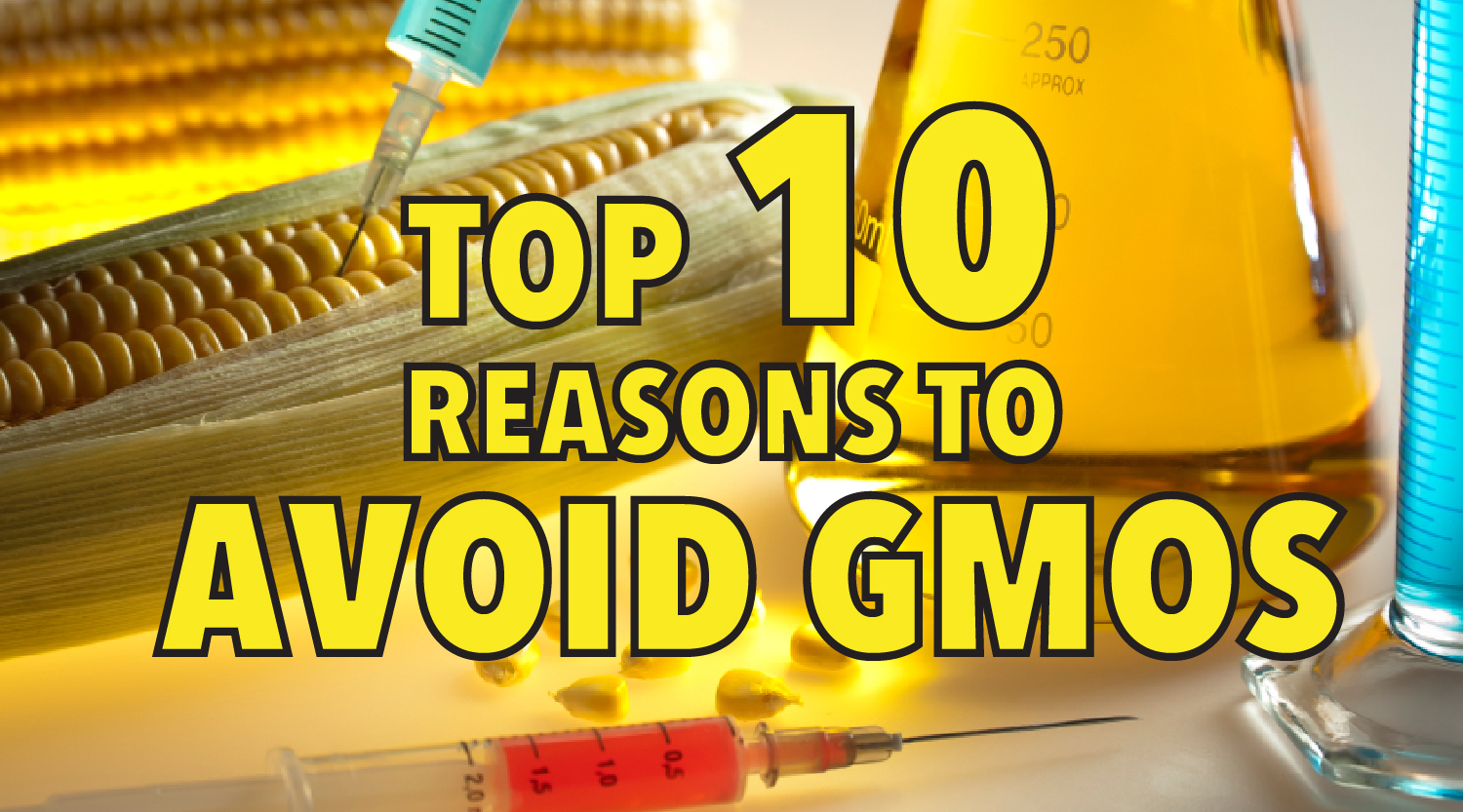Top 10 reasons to avoid GMOs
10/12/2015 / By John Allen

“Our interest is in selling as much of it as possible. Assuring its safety is the FDA’s job.”
— Phil Angell, Monsanto Director of Corporate Communications.
Mr. Angell was speaking of GMOs, and it’s true that, from the perspective of Monsanto and other dangerous product makers, safety is somebody else’s job. What he didn’t mention, however, is that Monsanto goes to great lengths to prevent that job from being done. Perhaps because, if enough people questioned the safety of GMOs, that would make “selling as much of it as possible” a lot more difficult.(1)
The long-term effects of GMOs are unknown
In international affairs, the so-called “precautionary principle” is based on the premise that nations have a sovereign right to take precautionary measures with regard to products that have not been shown to be socially or environmentally safe, whether it’s genetically altered seed, microbes, animals, crops or whatever. The chemical industry, backed by the United States government and international cabals like the World Trade Organization, refuses to accept the precautionary principle, and instead insists that it’s not the responsibility of corporations to prove that what they’re putting into the environment is safe, but rather it’s the public’s responsibility to prove scientifically that it’s unsafe. Some countries don’t make their sovereignty subordinate to the interests of global corporations. Russia, for example, bans GMOs in the interest of “protect[ing] our own market, and above all citizens,” as Vladimir Putin explains.(2, 3)
GMOs are an experiment that uses humans as guinea pigs
Developing GMOs without precaution means that we are experimental subjects of industry. One critic summed it up with the following analogy: “Suppose the biology department at the university were to walk in and tell you, ‘You folks have to be experimental subjects in an experiment we’re carrying out, where we’re going to stick electrodes in your brain and see what happens. You can refuse, but only if you provide scientific evidence that it’s going to harm you.'” According to the chemical companies, you don’t have a right to refuse.(4)
GMOs rely on junk science to con the public and evade regulation
In the United States, the citizenry’s only defense against GMOs are public agencies like the FDA and the EPA, who are not only underfunded but also corrupted by the very industries that they are charged with regulating. So the chemical industry has more influence over these public agencies than does the public, which has little role to play in a political system dominated by corporations. The chemical industry has an army of scientists on its payroll, and not surprisingly, their studies come out in favor of their employers, always concluding that GMOs are safe and even beneficial. This “junk science” sows confusion among legislators and regulators, as well as the public, preserving the industry’s freedom to do whatever it wants. As the country’s leading business journal put it, “Monsanto always wins.”(5, 6)
GMOs are great for the world’s most evil corporation
We don’t know how the GMO experiment will turn out for humanity, but we do know that it’s great for the corporations who manufacture them — especially Monsanto, which dominates the GMO market. The company got its start by inventing saccharin, an artificial sweetener that was eventually banned after it was shown to cause cancer. Its next big invention was polychlorinated biphenyls (PCBs), an ingredient in hundreds of industrial and commercial products which was also banned when it was discovered to be deadly 50 years later. Then the firm contributed to the development of nuclear weapons, which are of course an enduring threat to the survival of humanity.
Pesticides and herbicides were the next industry that Monsanto entered, most famously with its invention of DDT, which was banned when it was determined to be deadly 30 years afterward. In the 1960s, Monsanto found another use for its poisons: war crimes. For purposes of chemical warfare, tens of millions of gallons of the company’s Agent Orange were sprayed by the US military on Vietnam, and was banned many years later when it turned out that it was one of the most toxic chemicals on earth, poisoning thousands of Americans and millions of Vietnamese. Note that all Monsanto products mentioned — spanning almost a century — were eventually proven to have catastrophic effects on society, which would have been avoided if the precautionary principle had been applied. And now Monsanto wants the world to ignore the precautionary principle yet again, and just trust their claims of GMO safety. In 2000, a merger changed Monsanto’s name to Pharmacia, which then spun off its agricultural division as today’s independent company named Monsanto.(6, 7, 8)
GMOs can harm humans
Monsanto’s GM corn either produces or is coated with toxic chemicals, which are consumed by people who eat the corn. Scientific researchers found that 70 percent of female rats and 50 percent of males rats died prematurely when fed GMOs, almost all of them victims of cancer. In all, GMOs have been linked to 22 diseases. According to the American Academy of Environmental Medicine, “animal studies indicate serious health risks associated with GM food consumption including infertility, immune dysregulation, accelerated aging, dysregulation of genes associated with cholesterol synthesis, insulin regulation, cell signaling, protein formation, and changes in the liver, kidney, spleen, and gastrointestinal system.”(9, 10)
The GMO/pesticide Axis of Evil
Monsanto’s genetically-modified seeds are designed to be immune to Monsanto’s Roundup pesticide, but this has caused the development of superweeds which are also immune to Monsanto’s pesticide, requiring the use of more and more Monsanto pesticides. As of 2013, there are 24 different weeds that have evolved resistance to Roundup worldwide. One of the highly touted benefits of GMOs was that they would decrease dependence on pesticides, and now the chemical industry is recommending the use of more of their chemicals to attack the superweeds caused by their genetically modified seeds.(7, 11)
GMOs can harm agriculture
As independent media sources have extensively reported, GMO practices contaminate organic and local food systems. As much as 50 percent or more of non-GMO corn, canola and soybean seed has been contaminated with GMO genes. As the World Health Organization notes, “The migration of genes from GM plants into conventional crops or related species in the wild (referred to as ‘outcrossing’), as well as the mixing of crops derived from conventional seeds with GM crops, may have an indirect effect on food safety and food security. Cases have been reported where GM crops approved for animal feed or industrial use were detected at low levels in the products intended for human consumption.”(12, 13)
GMOs can harm the environment
The increased use of pesticides caused by GM seeds contaminates soil, making it unsuitable for traditional farming methods. And once a farm is addicted to Roundup, it becomes reliant on an increasing amount of environmentally harmful chemicals. Not only do the chemicals contaminate the immediate soil, but when it gets into nearby water sources, it can contaminate any soil downstream, and any life that depends on it.
GM crops also contribute to climate change due to reliance on synthetic nitrogen fertilizers, which are responsible for approximately 60 percent of total emissions of the greenhouse gas nitrous oxide.(9, 11)
GMOs can harm animals and insects
Research has shown that laboratory mammals fed GMOs suffer adverse effects that include damage to the kidneys, liver, adrenal glands, spleen and heart. Additionally, their immune systems were compromised, and in some cases brain size was reduced. There’s also evidence that beneficial insects can be harmed. A Cornell University study showed that monarch butterflies suffered higher mortality rates afater consuming milkweed leaves dusted with certain pesticides used on GM crops. GMO-related pesticides are also suspected to be a factor in the world’s collapsing bee population. And again, the United States government has taken the lead on protecting the interests of industry over humanity by refusing to sign a treaty on preserving the world’s natural species. As reported in The New York Times, Assistant Secretary of State for the Environment said that the treaty “fails to give adequate patent protection to American companies that transfer biotechnology to developing companies,” and “tries to regulate genetically engineered materials” — neither of which are acceptable to the corporations that the government exists to serve.(11, 14)
GMOs rip off farmers through monopolistic control of the market
In the United States, under pressure from agrichemical companies that rapidly took over the seed industry, legal decisions made seeds patentable, leading to their corporate control. By now, about 97 percent of certain GM seed markets is controlled by one entity: Monsanto.
Through their patents on GM seeds, Monsanto and other global agrichemical corporations achieve monopolistic ownership over them and use their patents to control farmers. For example, if one farmer’s Monsanto seeds blow into the fields of non-GMO farmers, patent law allows the non-GMO farmers to be sued for “theft” of Monsanto’s intellectual property. A report by the Center for Food Safety and Save Our Seeds notes, “As early as 2003, Monsanto had a department of 75 employees with a budget of $10 million for the sole purpose of pursuing farmers for patent infringement.” Followed to its logical conclusion, the patenting of seeds gives huge unaccountable corporations control over the source of life.(12, 15)
Sources:
(2) UNESDOC.UNESCO.org[PDF]
(3) NaturalNews.com
(4) Chomsky.info
(5) ZComm.org
(6) Fortune.com
(7) AlterNet.org
(8) Monsanto.com
(9) NaturalNews.com
(10) ZComm.org
(11) NaturalNews.com
(12) HuffingtonPost.com
(13) WHO.int
(14) ZComm.org
(15) CenterforFoodSafety.org[PDF]
Submit a correction >>
Tagged Under:
Agent Orange, biotechnology, Bt corn, cancer, corruption, DDT, disease, FDA, genetic modification, glyphosate, government, Monsanto, Roundup, seed patents, transgenic crops
This article may contain statements that reflect the opinion of the author
RECENT NEWS & ARTICLES
COPYRIGHT © 2017 TOP 10 GROCERY SECRETS





















